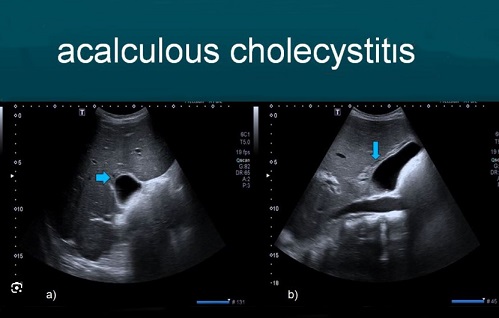Greek Medical Researchers Warn That COVID-19 Can Cause Acute Acalculous Cholecystitis
Nikhil Prasad Fact checked by:Thailand Medical News Team Mar 17, 2024 1 year, 9 months, 1 week, 6 days, 10 hours, 41 minutes ago
COVID-19 News: The COVID-19 pandemic has brought to light numerous challenges in the medical field, ranging from understanding the novel coronavirus's pathogenesis to managing its diverse clinical manifestations. One such area of interest is the association between COVID-19 and acute acalculous cholecystitis (AAC), a condition characterized by gallbladder inflammation in the absence of gallstones. Greek medical researchers, spearheaded by institutions like AHEPA University General Hospital and the University General Hospital of Patras-Greece, have been actively investigating the intricacies of AAC in COVID-19 patients. This
COVID-19 News report delves into their findings, exploring the pathogenesis, diagnostic approaches, treatment strategies, and outcomes of AAC in the context of COVID-19.
 COVID-19 Can Cause Acute Acalculous Cholecystitis
COVID-19 Can Cause Acute Acalculous Cholecystitis
In late 2020, Thailand
Medical News had covered a study by Swiss researchers that showed that SARS-CoV-2 could be found in the gall bladder and could mimic cholecystitis.
https://www.thailandmedical.news/news/breaking-covid-19-news-swiss-doctors-warn-that-sars-cov-2-can-be-found-in-gallbladder-of-patients-and-infections-can-mimic-acute-cholecystitis
However, since then, numerous case reports have emerged that SARS-CoV-2 infections can actually cause
cholecystitis. (refer to list of case reports in the actual study paper.)
Understanding Acute Acalculous Cholecystitis
Acute acalculous cholecystitis (AAC) is a relatively uncommon but serious condition that accounts for approximately 5–10% of all cases of acute cholecystitis in adults. Unlike calculous cholecystitis, which is characterized by the presence of gallstones, AAC occurs without evident gallstones and is often associated with critical illness. Risk factors for AAC include trauma, surgery, shock, sepsis, total parenteral nutrition (TPN), and mechanical ventilation. This condition poses a significant challenge due to its high mortality rate, estimated at around 30%, and its propensity for complications such as necrosis, perforation, and empyema.
The Impact of COVID-19 on Gastrointestinal Health
The severe acute respiratory syndrome coronavirus 2 (SARS-CoV-2), responsible for COVID-19, has been shown to affect various organ systems beyond the respiratory tract. One area of concern is its impact on the gastrointestinal (GI) tract, given the high expression of angiotensin-converting enzyme 2 (ACE2) receptors in GI tissues. COVID-19 patients often present with GI symptoms, including anorexia, diarrhea, nausea/vomiting, and abdominal pain/discomfort. Seve
re cases can lead to life-threatening complications such as ileus and mesenteric ischemia, highlighting the diverse manifestations of the disease.
Biliary Manifestations of COVID-19: The Link to AAC
Recent reports from Greek medical researchers and global studies have highlighted the occurrence of acute cholecystitis, particularly AAC, in COVID-19 patients, especially those in critical condition requiring mechanical ventilation.
The pathogenesis of AAC in COVID-19 remains under investigation, with hypotheses suggesting direct viral invasion of the biliary system through ACE2 receptors, inflammation from cytokine release, ischemia due to hypercoagulability, and other potential mechanisms. While the exact relationship between COVID-19 and AAC is complex and multifactorial, understanding these pathways is crucial for effective management.
Pathogenesis of AAC in COVID-19
Greek medical researchers have delineated several potential mechanisms contributing to AAC development in COVID-19 patients. These include:
-Bile Stasis and Ischemia: Critical illness, prolonged fasting, volume depletion, and certain medications can lead to bile stasis and subsequent gallbladder ischemia, predisposing patients to AAC.
-Direct Viral Invasion: SARS-CoV-2's affinity for ACE2 receptors in the biliary system may result in direct viral invasion and inflammatory responses within the gallbladder.
-Inflammatory Pathways: Systemic inflammation and cytokine release associated with COVID-19 may contribute to gallbladder inflammation and AAC.
-Coagulopathy and Thrombosis: COVID-19-induced coagulopathy can lead to small-vessel thrombosis, potentially affecting blood supply to the gallbladder and promoting AAC development.
Diagnostic Challenges and Imaging Modalities
Diagnosing AAC in COVID-19 patients presents unique challenges, especially in critically ill individuals. Clinical manifestations such as fever, right upper abdominal pain, and laboratory abnormalities may overlap with other conditions. Therefore, imaging modalities play a crucial role in confirming AAC diagnosis and guiding treatment decisions. Common imaging techniques include ultrasound, CT scan, MRCP, and occasionally, ERCP for therapeutic interventions. These modalities help differentiate AAC from other GI pathologies and guide appropriate management strategies.
Treatment Strategies and Outcomes
Treatment of AAC in COVID-19 patients is multifaceted and depends on disease severity, patient comorbidities, and the presence of complications. Conservative management with antibiotics and percutaneous cholecystostomy may suffice for mild cases, while severe AAC often requires surgical intervention such as cholecystectomy. Greek medical researchers emphasize the importance of tailored treatment approaches to optimize outcomes and reduce mortality rates associated with AAC in COVID-19.
Conclusion
In conclusion, the association between COVID-19 and acute acalculous cholecystitis presents a complex interplay of viral pathogenesis, host factors, and clinical manifestations. Greek medical researchers have made significant strides in unraveling this relationship, shedding light on the mechanisms underlying AAC in COVID-19 patients and guiding evidence-based management strategies. Continued research and collaboration are essential to further elucidate the impact of COVID-19 on biliary health and improve outcomes for affected individuals.
The study findings were published in the peer reviewed journal: Viruses.
https://www.mdpi.com/1999-4915/16/3/455
For the latest
COVID-19 News, keep on logging to Thailand Medical News.
Read Also:
https://www.thailandmedical.news/news/breaking-covid-19-news-case-study-shows-that-even-asymptomatic-sars-cov-2-infections-can-lead-to-spontaneous-bowel-perforations
https://www.thailandmedical.news/news/breaking-u-s-fda-study-discovers-that-diabetics-taking-glp-1-receptor-agonists-drugs-have-higher-risk-of-acute-cholecystitis-and-death
